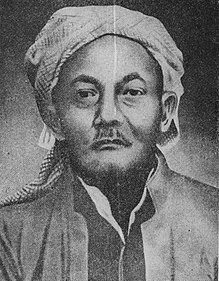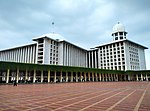Hasyim Asy'ari
Hasyim Asy'ari | |
|---|---|
 Hasyim Asy'ari | |
| Born | Muhammad Hasyim 14 February 1871[1] / 10 April 1875[2] |
| Died | 25 July 1947 (aged 76/72) Jombang, Indonesia |
| Nationality | Indonesian |
| Occupation | Ulama |
| Known for | Rais Akbar Nahdlatul Ulama |
Kyai Haji Hasyim Asy'ari (14 February 1871 or 10 April 1875 – 25 July 1947) was an Indonesian ulama, National Hero and founder of Nahdlatul Ulama.
Biography[edit]
Hasyim Asy'ari was born Muhammad Hasyim in Gedang, Jombang Regency[3] on 10 April 1875. His parents were Asy'ari and Halimah. His family was deeply involved in the administrations of pesantrens (local Islamic boarding schools). His grandfather, Kiai Usman was the founder of Pesantren Gedang and his great-grandfather was the founder of Pesantren Tambakberas. He was the third son of ten siblings.[4]
Hasyim Asy'ari's ancestry can be traced to Sultan Hadiwijaya of Pajang, and further, to Brawijaya VI (Girindrawardhana), the last king of Majapahit.[citation needed]
He was educated by Ahmad Khatib al-Minangkabawi, an Imam at Masjid al-Haram, an ulama, and Ahmad Dahlan, the founder of Muhammadiyah.[5]
At the age of twenty, he married Khadijah, the daughter of Pesantren Siwalan Panji leader. One year later, they went to Mecca. After seven months, his wife died, and also his son, Abdullah two months later.[6]
In 1899, he founded Pesantren Tebuireng, which later became the largest pesantren in Java in the early 20th century having four thousand students in 1947.[7] The pesantren also became the center for the reform of traditional Islamic teaching.[8]
On 31 January 1926, he and several traditional Islamic leaders founded Nahdlatul Ulama (Awakening of Ulamas). During the Japanese occupation era, he was arrested, and several months later he was released and became Head of Religious Affairs.[8]
He died suddenly on 25 July 1947 due to hypertension, after hearing news that Dutch troops were winning a battle in Malang.[9]
Personal life[edit]
He married seven times and all of his wives were daughters of ulama. Four of his wives were Khadijah, Nafisah, Nafiqah and Masrurah. One of his sons, Wahid Hasyim was one of the formulators of the Jakarta Charter and later became Minister of Religious Affairs,[10] while his grandson Abdurrahman Wahid became President of Indonesia.
References[edit]
- ^ "Biography of KH Hasyim Asy'ari: Origin, Genealogy, Thought, to Struggle". 21 April 2021.
- ^ "The Struggle of KH Hasyim Asy'ari, the Missing National Hero in the Indonesian History Dictionary". 21 April 2021.
- ^ Online, NU. "Keindonesiaan Kiai: Hasyim Asy'ari, Wahid Hasyim, dan Gus Dur | NU Online". NU Online. Retrieved 2018-09-12.
- ^ Khuluq 2008, pp. 16–18
- ^ Saputra, Amrizal, Wira Sugiarto, Suyendri, Zulfan Ikhram, Khairil Anwar, M. Karya Mukhsin, Risman Hambali, Khoiri, Marzuli Ridwan Al-bantany, Zuriat Abdillah, Dede Satriani, Wan M. Fariq, Suwarto, Adi Sutrisno, Ahmad Fadhli (2020-10-15). PROFIL ULAMA KARISMATIK DI KABUPATEN BENGKALIS: MENELADANI SOSOK DAN PERJUANGAN (in Indonesian). CV. DOTPLUS Publisher. p. 148. ISBN 978-623-94659-3-3.
{{cite book}}: CS1 maint: multiple names: authors list (link) - ^ Khuluq 2008, pp. 19–20
- ^ Naipaul, V. S. (Vidiadhar Surajprasad) (1999), Beyond belief : Islamic excursions among the converted peoples, Abacus, p. 32, ISBN 978-0-349-11010-3
- ^ a b "Ulama Pembaharu Pesantren". tokohindonesia.com. Archived from the original on March 4, 2016. Retrieved October 22, 2011.
- ^ Khuluq 2008, p. 25
- ^ Khuluq 2008, pp. 20–21
Bibliography[edit]
- Khuluq, Lathiful (2008). Fajar Kebangunan Ulama: Biografi K.H. Hasyim Asy'ari. Yogyakarta: LKiS Yogyakarta. ISBN 978-979-8966-37-8.


 French
French Deutsch
Deutsch